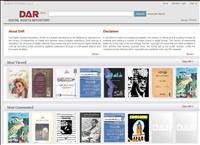Launching a New Version of DAR
Posted on

Since its launch, the Information and Communication Technology (ICT) Sector has ever been upgrading the Digital Assets Repository (DAR), deploying innovative tools which add to the latest emerging technologies in digital libraries. As an extension to that, DAR Ver3.0- has been launched, a total revamp of the system.
The new system provides a more advanced version of the digital book portal which holds more than 180,000 books, around 93% of which are Arabic, thus representing the largest Arabic Digital Library on the Internet.
It comes with a variety of interactive and customization functionalities for end users. This includes different viewing options for book readers allowing them to explore this vast collection according to their preferences. They may browse books as “Most Viewed”, “Top Rated” or “Most Commented on”, or even narrow down their browsing to specific choices of their interest using Faceted Search. This is in addition to the search facility applicable across the whole collection using simple or advanced search, providing morphological search and highlighting the occurrences of the searched term throughout the book pages metadata and content.
The new release of DAR has also provided books with annotation tools needed by users to customize and to freely interact with the content of books. These give users the opportunity to select certain spans of text, highlight them, underline them or even add sticky notes with their personal comments. Registered users are even given the privilege of arranging the books of their interest in folders thus creating their own “Bookshelves” online.
On another front, the newly implemented system provides the tools for book sharing, tagging, rating, embedding in other social networks and allows users to also submit comments.
The new release of DAR offers a new experience of digital book browsing, which is considered an important milestone in the Digital Libraries arena.
DAR has been demonstrated at the Digital Library Federation (DLF) in November 2010 and was received with significant interest among other conference participants.